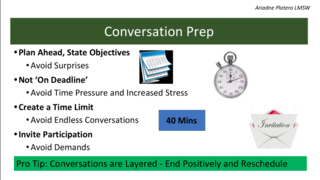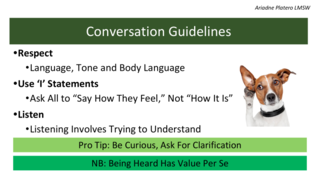Career
Talking About Talking: Prepping for Conversations Is Key
Do your conversations sometimes not go quite as you'd hoped?
Posted March 31, 2021 Reviewed by Lybi Ma
Key points
- The success of meaningful conversations depends on preparing mindfully ahead of time.
- Discussing each party's goals, expectations, and assumptions ahead of time will ensure a more productive conversation.
- Thoughtful language and tone denote respect; be an active listener and ask for clarification to support understanding.
If you want your important conversations to go well, the key is to prepare for them properly, and I’m not talking just about knowing what you want to say. It’s vital to fully understand the situation or have a preparatory conversation so that you can manage all the variables that different people bring to a discussion.
Whether I’m wearing my family therapist or performance coach hat, I spend a lot of time discussing communication. For many therapists and coaches, it’s a touchstone for our approach to helping clients achieve their goals. When we get to the subject of communication, I’ll ask clients to reflect on their manner and tone of delivery, whether they’re prone to harsh start-ups when they’re agitated or, alternatively, to not speaking up at all. While it’s crucial to be able to reflect on our own delivery and recognize what it may sound like to others, change is longer lasting and more meaningful once we begin to understand why we developed a certain style of communicating. What are our triggers? What is the lens or filter through which we see and hear the world around us? How did it come to be this way? Once this understanding begins to emerge, we can look at how that has translated into a pattern of responses and how we communicate at home, at work, and out in the world.
This reflection, exploration, and discovery can be in specific sessions committed to this topic or can weave through many sessions as we discuss and work on particular incidents or, more generally, the many different aspects of a client’s life, goals, and desires for change.
Most of us know that the self-knowledge around what and how we communicate is vital. So, I am surprised how often clients will embrace this first part of reviewing their communication style and effectiveness but will resist the next suggestion—the idea of preparing intentionally before major conversations, a stage I sometimes label Talking About Talking.
We no longer question the need for practice ahead of a big competition, maybe a tennis match—gone is the illusion that being the effortless expert is a goal to strive for. Practice is important and admirable.
Most of us don’t question the need for practice before a major work presentation. We know that we strengthen our performance by mastering content, we lower our anxiety with successful runs-through, and we improve our delivery with review and practice ahead of time.

Why then, is there such a resistance to preparing for important conversations?
My guess is that it falls into the same category of misplaced beliefs that so many, including me, subscribe to at times. This includes the belief that our partners should be able to mind-read what we want, that something is less valuable if we have to ask for it, and that if we were really attuned to our families or work colleagues we shouldn’t have to strive for understanding and clarity. In short, there’s the myth that, ideally, these things should come naturally and effortlessly if they’re to be valued.
This couldn’t be further from the truth.
Think of it this way: Conversations are built upon each other, each one lying on top of the previous one like the layers of paint on a lacquered box. They all rest on and, in some ways, depend on their predecessors. Despite the fact that, technically speaking, you only see only the last layer in the finished version of the box, the multiple layers are intrinsic to its final look, luster, and quality.

So let’s quickly run through a shortlist of the topics that should be in our Talking About Talking conversation, in our preparations to lay the groundwork for the more substantive subjects you need to cover later:
- Who will be in attendance and assumptions each participant is bringing to the discussion.
- Expectations each person has for topics to be covered.
- Goals for the discussion: Is this just preliminary? Is a conclusion or final decision needed?
In all of these areas, we need to be aware of the different experiences each of us brings to any situation, the different lens each of us has developed, and the varying levels of acceptable risk and conflict that each can tolerate.
Here are a few preparatory guidelines and conversational tools to keep in mind whether you’re having a familial or personal discussion or a meeting in the workplace:
- Invite participation in the conversation, avoiding making demands if at all possible.
- Don’t discuss too close to a deadline if an earlier conversation would have been possible.
- Introduce a time limit in an attempt to avoid endless conversations, which inevitably deteriorate.
- Try to finish on a high note, emphasizing progress, and reschedule to pick up where you left off.
And finally:
- Be aware of your content, tone, and body language so that you’re showing respect to all the interlocutors.
- Try to use “I” statements so that you can describe how you feel or what you think about something rather than falling into stating “how it is.”
- Listening is key and involves being curious and asking for clarification in an effort to understand what the other is saying.
- Remember that it's easier for any of us to compromise if we feel we’ve been heard.

The more mindful you are about all these things, the better the meeting will go.
Obviously, if you’re planning a family conversation, the more thoughtful and sensitive you are to others' points of view, the better it will turn out, but even in the workplace, and even if you’re the boss, you’d be amazed how listening to others and taking their viewpoints into consideration will benefit you. Apart from all the other advantages, it counters the reported tendency that the longer we’re in charge, the less attuned to others we become.
It is extra work, but try it. I think you’ll like the results.
Next month, we’ll tackle conversational impasses.




